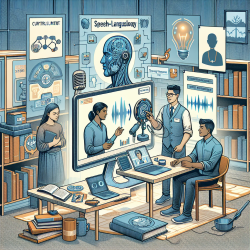Introduction
Artificial Intelligence (AI) is rapidly transforming the landscape of healthcare, offering promising advancements in clinical decision-making, workflow efficiency, and patient outcomes. A recent study titled Health Care Students’ Perspectives on Artificial Intelligence: Countrywide Survey in Canada sheds light on the perceptions and readiness of future healthcare professionals to integrate AI into their practice. This blog explores how speech-language pathologists (SLPs) can leverage these insights to enhance their practice and educational strategies.
Key Findings from the Survey
The survey, conducted across 18 Canadian universities, gathered responses from 2,167 students in various health professions, including speech-language pathology. Notably, 78.77% of respondents anticipated that AI would impact their careers within the next decade, and 74.5% expressed a positive outlook on AI's role in healthcare. However, there was a significant knowledge gap, with over half of the students unable to accurately define AI.
Implications for Speech-Language Pathologists
As SLPs, understanding and integrating AI into our practice can significantly enhance our service delivery. Here are some actionable insights derived from the survey:
- Embrace AI Literacy: The survey highlights a critical need for AI education. SLPs should advocate for and participate in AI literacy programs, ensuring they are equipped to utilize AI tools effectively in diagnostics and therapy.
- Interdisciplinary Collaboration: AI's potential in healthcare is maximized through interdisciplinary efforts. SLPs should collaborate with AI specialists and other healthcare providers to develop and refine AI applications tailored to speech and language disorders.
- Focus on Ethical Implications: Understanding the ethical considerations of AI in healthcare is paramount. SLPs must engage in discussions about data privacy, consent, and the ethical use of AI in patient care.
Encouraging Further Research and Curriculum Development
The survey indicates a strong desire among students for AI to be incorporated into their curricula. For SLPs, this presents an opportunity to advocate for curriculum changes that include AI education. By doing so, we can prepare future practitioners to harness AI's full potential, ultimately improving patient outcomes.
Moreover, the findings suggest that students prefer learning AI through workshops and practical sessions. SLPs should consider these preferences when designing educational programs, ensuring they are engaging and relevant to clinical practice.
Conclusion
AI is poised to play a transformative role in speech-language pathology. By understanding the insights from the Canadian survey, SLPs can better prepare for the integration of AI into their practice. This involves not only enhancing AI literacy and ethical understanding but also advocating for curriculum development that reflects the evolving landscape of healthcare.
To read the original research paper, please follow this link: Health Care Students’ Perspectives on Artificial Intelligence: Countrywide Survey in Canada.










